

Employees' location data monitored with privacy safeguards. Employees’ location data monitored with privacy safeguards Giulio Coraggio on 20 November, 2014 - 1:34 pm in data protection, privacy It is possible to collect location data relating to employees through smartphone Apps if used in order to optimize the usage of resources and improve their management, coordination and timing provided that this practice complies with the stringent obligations imposed by the Italian privacy authority.
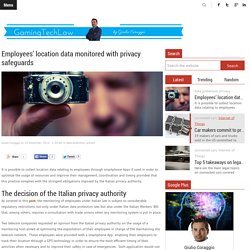
The decision of the Italian privacy authority As covered in this post, the monitoring of employees under Italian law is subject to considerable regulatory restrictions not only under Italian data protection law, but also under the Italian Workers’ Bill that, among others, requires a consultation with trade unions when any monitoring system is put in place. The Italian privacy authority took a very forward looking approach allowing the collection of location data through such smartphone App provided that:
Developers must address the ethics of using location data. To collect butterflies, you need a net, pins and card.

You catch the butterfly in the net, then you pin it to the card. Down in Silicon Valley, the nets are made, the butterflies stuck with red pins to cinema seats and coffee shops. By now, we’re so used to tracking location that it’s hard to image life without it. The Strange and Unmarked Road Ahead for Privacy.
Use it or Share it: Unlocking the Vast Wasteland of Fallow Spectrum by Michael Calabrese. New America Foundation - Open Technology InitiativeSeptember 25, 2011 Abstract: This paper suggests a general approach to authorizing and encouraging the utilization of otherwise wasted spectrum capacity: Use it or share it.

The Federal Communication Commission and Obama Administration propose to meet exponential growth in mobile data demand by reallocating 500 MHz over 10 years. The Future of Cybertravel: Legal Implications of the Evasion of Geolocation by Marketa Trimble. University of Nevada, Las Vegas, William S.
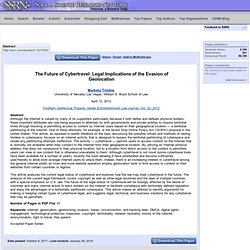
Boyd School of LawApril 12, 2012 Fordham Intellectual Property, Media & Entertainment Law Journal, Vol. 22, 2012. Personal Jurisdiction, Internet Commerce, and Privacy: The Pervasive Legal Consequences of Modern Geolocation Technologies by Kevin King. Modern geolocation technologies allow Internet sites to automatically and accurately identify a user’s geographic location.
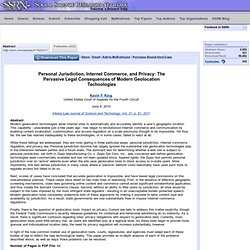
This capability - unavailable just a few years ago - has begun to revolutionize Internet commerce and communication by enabling content localization, customization, and access regulation on a scale previously thought to be impossible. Yet thus far, the law has reacted inadequately to these technologies, or in some cases, failed to react at all. While these failings are widespread, they are most glaring in three particular areas: personal jurisdiction, Internet commerce regulation, and privacy law. Personal jurisdiction doctrine has largely ignored the substantial role geolocation technologies play in the interaction between parties and a forum state. The dominant test for determining whether a web site is subject to personal jurisdiction, set forth in Zippo Manufacturing Co. v.
GPS devices, geolocation data create privacy, security risks. In 2005, American Car Rental, doing business as Acme Rent-A-Car, used the Global Positioning System (GPS) devices in its rental cars to track the driving speeds of its customers.
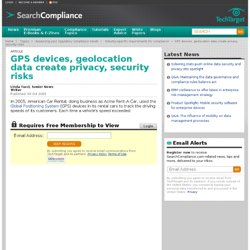
Each time a vehicle's speed exceeded When you become a member, my editorial team will provide you with expert insight for creating and maintaining a manageable compliance infrastructure. From targeted tips to webcasts and discussion forums, we have you covered. 79 miles per hour for two continuous minutes or more, the car company charged the driver $150. Some customers were not given advance notification of the fees, discovering the charges weeks later on their credit card bills. Is this just a matter for the car rental industry? As applications and services for broadcasting a person's geographic location become more widespread, from Google Latitude and the GPS-enabled Garmin nuvifone to travel aggregation sites like TripIt , corporate policy questions and legislative action are bound to increase.
Digital Lab » Geo-location. The future of privacy law in the era of Foursquare and check-ins. William Carleton: The United States vs.
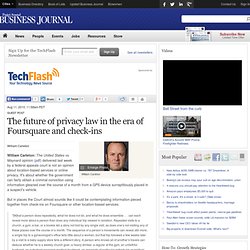
Maynard opinion (pdf) delivered last week by a federal appeals court is not an opinion about location-based services or online privacy. Infographic of the Day: How Your Favorite Websites Spy on You. We all know, vaguely, that the websites we visit are tracking us with cookies and whatnot, silently scraping data on how and where we surf.

But when you see the facts all laid out for you, it's gobsmacking. The Wall Street Journal just published the results of an investigation they did into tracking habits at the Web's top 50 websites, and summed up the results in this superb infographic. Basically, the top half shows the Web's top 50 websites; the bottom half shows the tracking companies whose software can be found on those sites. Hong Kong’s Privacy Laws Slammed After Octopus Fiasco. By Liang Lusi & Sonya BryskineEpoch Times Staff Created: August 5, 2010 Last Updated: August 8, 2010 [ Octopus Holdings Pty.

CEO Resigns After Privacy Breach ] A major privacy breach has unfolded in Hong Kong, with revelations a popular cashless payment operator has made millions selling personal information of thousands of clients without their consent, but some observers are saying the fiasco is just the tip of the iceberg. Information surfaced last month that Octopus Holdings Pty. had sold two million personal data records to six insurance companies, without obtaining the users’ direct consent.
According to the company’s CEO Prudence Chan, the sales brought HK$44 million in revenue, reported Bloomberg. The Octopus Cards, essentially a cashless rechargeable facility, were introduced in 1997 as an easy one-stop-shop option for payments. They are used by millions of Hong Kong residents to purchase everything from public transport tickets, to groceries, food at fast food stores and parking.
How much information are you really disclosing online? Almost certainly more than you think! The increase in use of social networking sites such as Facebook and Twitter means that individuals are putting vast amounts of information about themselves online.
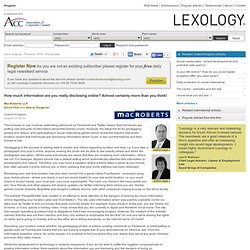
However, the latest trends for geotagging photos and videos, and participating in social networking games which reveal the player's real world location means that individuals are disclosing information which could, in fact, put themselves and their homes at risk. GPS Tracking Without a Warrant Declared Legal. Debates: Online privacy: Statements. The real reason location services aren’t so smart. For all the hype and attention location-based services are getting these days, only 1 in 25 Americans have ever tried one, and only 1 out of 100 use them weekly, according to a recent survey by Forrester Research. What’s the problem? Some people wring their hands about privacy. Others suggest a generation gap is at play.
Politicians call for 'geotagging' laws ahead of data summit. Location-based services find niche. Location Based Services - A Double-Edged Sword. It sure seems to me that everywhere I turn of late, I am being greeted with either a new service offering to enhance my life by providing my precise geo-location to a retailer or inserting my data into one of the many location-based services* available to collate my whereabouts and analyze my behavior. The future of privacy law in the era of Foursquare and check-ins. Location and Privacy - What is the New "Reasonable" Location has arrived – and it is raising all sorts of privacy concerns. In the past few months alone: 1. Facebook launches “Places” and within hours the media and privacy begin criticizing the service as failing to adequately, address privacy concerns. Digital Identity, Privacy, and the Internet's Missing Identity Layer. Last week I gave a presentation at PII 2010 in Seattle where I tried to summarize what I had learned from my recent work on WiFi location services and identity.
During the question period an audience member asked me to return to the slide where I recounted how I had first encountered Apple's new location tracking policy: My questioner was clearly a bit irritated with me, Didn't I realize that the “unique device identifier” was just a GUID – a purely random number? It wasn't a MAC address. Legal Blog Watch.